- Home
- Lemony Snicket
The Bad Beginning Page 2
The Bad Beginning Read online
Page 2
Mr. Poe tipped his hat to Justice Strauss, who smiled at the children and disappeared into her lovely house. Klaus stepped forward and knocked on Count Olaf's door, his knuckles rapping right in the middle of the carved eye. There was a pause, and then the door creaked open and the children saw Count Olaf for the first time.
``Hello hello hello,'' Count Olaf said in a wheezy whisper. He was very tall and very thin, dressed in a gray suit that had many dark stains on it. His face was unshaven, and rather than two eyebrows, like most human beings have, he had just one long one. His eyes were very, very shiny, which made him look both hungry and angry. ``Hello, my children. Please step into your new home, and wipe your feet outside so no mud gets indoors.''
As they stepped into the house, Mr. Poe behind them, the Baudelaire orphans realized what a ridiculous thing Count Olaf had just said. The room in which they found themselves was the dirtiest they had ever seen, and a little bit of mud from outdoors wouldn't have made a bit of difference. Even by the dim light of the one bare lightbulb that hung from the ceiling, the three children could see that everything in this room was filthy, from the stuffed head of a lion which was nailed to the wall to the bowl of apple cores which sat on a small wooden table.
Klaus willed himself not to cry as he looked around.
``This room looks like it needs a little work,'' Mr. Poe said, peering around in the gloom.
``I realize that my humble home isn't as fancy as the Baudelaire mansion,'' Count Olaf said, ``but perhaps with a bit of your money we could fix it up a little nicer.''
Mr. Poe's eyes widened in surprise, and his coughs echoed in the dark room before he spoke.
``The Baudelaire fortune,'' he said sternly, ``will not be used for such matters. In fact, it will not be used at all, until Violet is of age.''
Count Olaf turned to Mr. Poe with a glint in his eye like an angry dog. For a moment Violet thought he was going to strike Mr. Poe across the face. But then he swallowed-the children could see his Adam's apple bob in his skinny throat-and shrugged his patchy shoulders.
``All right then,'' he said. ``It's the same to me. Thank you very much, Mr. Poe, for bringing them here. Children, I will now show you to your room.''
``Good-bye, Violet, Klaus, and Sunny,'' Mr. Poe said, stepping back through the front door. ``I hope you will be very happy here. I will continue to see you occasionally, and you can always contact me at the bank if you have any questions.''
``But we don't even know where the bank is,'' Klaus said.
``I have a map of the city,'' Count Olaf said. ``Good-bye, Mr. Poe.''
He leaned forward to shut the door, and the Baudelaire orphans were too overcome with despair to get a last glimpse of Mr. Poe. They now wished they could all stay at the Poe household, even though it smelled. Rather than looking at the door, then, the orphans looked down, and saw that although Count Olaf was wearing shoes, he wasn't wearing any socks. They could see, in the space of pale skin between his tattered trouser cuff and his black shoe, that Count Olaf had an image of an eye tattooed on his ankle, matching the eye on his front door. They wondered how many other eyes were in Count Olaf's house, and whether, for the rest of their lives, they would always feel as though Count Olaf were watching them even when he wasn't nearby.
Chapter Three
I don't know if you've ever noticed this, but first impressions are often entirely wrong. You can look at a painting for the first time, for example, and not like it at all, but after looking at it a little longer you may find it very pleasing. The first time you try Gorgonzola cheese you may find it too strong, but when you are older you may want to eat nothing but Gorgonzola cheese. Klaus, when Sunny was born, did not like her at all, but by the time she was six weeks old the two of them were thick as thieves. Your initial opinion on just about anything may change over time.
I wish I could tell you that the Baudelaires' first impressions of Count Olaf and his house were incorrect, as first impressions so often are. But these impressions-that Count Olaf was a horrible person, and his house a depressing pigsty-were absolutely correct. During the first few days after the orphans arrival at Count Olaf's, Violet, Klaus, and Sunny attempted to make themselves feel at home, but it was really no use. Even though Count Olaf's house was quite large, the three children were placed together in one filthy bedroom that had only one small bed in it. Violet and Klaus took turns sleeping in it, so that every other night one of them was in the bed and the other was sleeping on the hard wooden floor, and the bed's mattress was so lumpy it was difficult to say who was more uncomfortable. To make a bed for Sunny, Violet removed the dusty curtains from the curtain rod that hung over the bedroom's one window and bunched them together to form a sort of cushion, just big enough for her sister. However, without curtains over the cracked glass, the sun streamed through the window every morning, so the children woke up early and sore each day. Instead of a closet, there was a large cardboard box that had once held a refrigerator and would now hold the three children's clothes, all piled in a heap. Instead of toys, books, or other things to amuse the youngsters, Count Olaf had provided a small pile of rocks. And the only decoration on the peeling walls was a large and ugly painting of an eye, matching the one on Count Olaf's ankle and all over the house.
But the children knew, as I'm sure you know, that the worst surroundings in the world can be tolerated if the people in them are interesting and kind. Count Olaf was neither interesting nor kind; he was demanding, short-tempered, and bad-smelling. The only good thing to be said for Count Olaf is that he wasn't around very often. When the children woke up and chose their clothing out of the refrigerator box, they would walk into the kitchen and find a list of instructions left for them by Count Olaf, who would often not appear until nighttime. Most of the day he spent out of the house, or up in the high tower, where the children were forbidden to go. The instructions he left for them were usually difficult chores, such as repainting the back porch or repairing the windows, and instead of a signature Count Olaf would draw an eye at the bottom of the note.
One morning his note read, ``My theater troupe will be coming for dinner before tonight's performance. Have dinner ready for all ten of them by the time they arrive at seven o'clock. Buy the food, prepare it, set the table, serve dinner, clean up afterwards, and stay out of our way.'' Below that there was the usual eye, and underneath the note was a small sum of money for the groceries.
Violet and Klaus read the note as they ate their breakfast, which was a gray and lumpy oatmeal Count Olaf left for them each morning in a large pot on the stove. Then they looked at each other in dismay.
``None of us knows how to cook,'' Klaus said.
``That's true,'' Violet said. ``I knew how to repair those windows, and how to clean the chimney, because those sorts of things interest me. But I don't know how to cook anything except toast.''
``And sometimes you burn the toast,'' Klaus said, and they smiled. They were both remembering a time when the two of them got up early to make a special breakfast for their parents. Violet had burned the toast, and their parents, smelling smoke, had run downstairs to see what the matter was. When they saw Violet and Klaus, looking forlornly at pieces of pitch-black toast, they laughed and laughed, and then made pancakes for the whole family.
``I wish they were here,'' Violet said. She did not have to explain she was talking about their parents. ``They would never let us stay in this dreadful place.''
``If they were here,'' Klaus said, his voice rising as he got more and more upset, ``we would not be with Count Olaf in the first place. I hate it here, Violet! I hate this house! I hate our room! I hate having to do all these chores, and I hate Count Olaf!''
``I hate it too,'' Violet said, and Klaus looked at his older sister with relief. Sometimes, just saying that you hate something, and having someone agree with you, can make you feel better about a terrible situation. ``I hate everything about our lives right now, Klaus,'' she said, ``but we have to keep our chin up.'' This was an expression t
he children's father had used, and it meant ``try to stay cheerful.''
``You're right,'' Klaus said. ``But it is very difficult to keep one's chin up when Count Olaf keeps shoving it down.''
``Jook!'' Sunny shrieked, banging on the table with her oatmeal spoon. Violet and Klaus were jerked out of their conversation and looked once again at Count Olaf's note.
``Perhaps we could find a cookbook, and read about how to cook,'' Klaus said. ``It shouldn't be that difficult to make a simple meal.'' Violet and Klaus spent several minutes opening and shutting Count Olaf's kitchen cupboards, but there weren't any cookbooks to be found.
``I can't say I'm surprised,'' Violet said. ``We haven't found any books in this house at all.''
``I know,'' Klaus said miserably. ``I miss reading very much. We must go out and look for a library sometime soon.''
``But not today,'' Violet said. ``Today we have to cook for ten people.''
At that moment there was a knock on the front door. Violet and Klaus looked at one another nervously.
``Who in the world would want to visit Count Olaf?'' Violet wondered out loud.
``Maybe somebody wants to visit us,'' Klaus said, without much hope. In the time since the Baudelaire parent's death, most of the Baudelaire orphans' friends had fallen by the wayside, an expression which here means ``they stopped calling, writing, and stopping by to see any of Baudelaires, making them very lonely.'' You and I, of course, would never do this to any of our grieving acquaintances, but it is a sad truth in life that when someone has lost a loved one, friends sometimes avoid the person, just when the presence of friends is most needed.
Violet, Klaus, and Sunny walked slowly to the front door and peered through the peephole, which was in the shape of an eye. They were delighted to see Justice Strauss peering back at them, and opened the door.
``Justice Strauss!'' Violet cried. ``How lovely to see you.'' She was about to add, ``Do come in,'' but then she realized that Justice Strauss would probably not want to venture into the dim and dirty room.
``Please forgive me for not stopping by sooner,'' Justice Strauss said, as the Baudelaires stood awkwardly in the doorway. ``I wanted to see how you children were settling in, but I had a very difficult case in the High Court and it was taking up much of my time.''
``What sort of case was it?'' Klaus asked. Having been deprived of reading, he was hungry for new information.
``I can't really discuss it,'' Justice Strauss said, ``because it's official business. But I can tell you it concerns a poisonous plant and illegal use of someone's credit card.''
``Yeeka!'' Sunny shrieked, which appeared to mean ``How interesting!'' although of course there is no way that Sunny could understand what was being said.
Justice Strauss looked down at Sunny and laughed. ``Yeeka indeed,'' she said, and reached down to pat the child on the head. Sunny took Justice Strauss's hand and bit it, gently.
``That means she likes you,'' Violet explained.
``She bites very, very hard if she doesn't like you, or if you want to give her a bath.''
``I see,'' Justice Strauss said. ``Now then, how are you children getting on? Is there anything you desire?''
The children looked at one another, thinking of all the things they desired. Another bed, for example. A proper crib for Sunny. Curtains for the window in their room. A closet instead of a cardboard box. But what they desired most of all, of course, was not to be associated with Count Olaf in any way whatsoever. What they desired most was to be with their parents again, in their true home, but that, of course, was impossible. Violet, Klaus, and Sunny all looked down at the floor unhappily as they considered the question. Finally, Klaus spoke.
``Could we perhaps borrow a cookbook?'' he said. ``Count Olaf has instructed us to make dinner for his theater troupe tonight, and we can't find a cookbook in the house.''
``Goodness,'' Justice Strauss said. ``Cooking dinner for an entire theater troupe seems like a lot to ask of children.''
``Count Olaf gives us a lot of responsibility,'' Violet said. What she wanted to say was, ``Count Olaf is an evil man,'' but she was well mannered.
``Well, why don't you come next door to my house,'' Justice Strauss said, ``and find a cookbook that pleases you?''
The youngsters agreed, and followed Justice Strauss out the door and over to her well-kept house. She led them through an elegant hallway smelling of flowers into an enormous room, and when they saw what was inside, they nearly fainted from delight, Klaus especially.
The room was a library. Not a public library, but a private library; that is, a large collection of books belonging to Justice Strauss. There were shelves and shelves of them, on every wall from the floor to the ceiling, and separate shelves and shelves of them in the middle of the room. The only place there weren't books was in one corner, where there were some large, comfortable-looking chairs and a wooden table with lamps hanging over them, perfect for reading. Although it was not as big as their parents' library, it was as cozy, and the Baudelaire children were thrilled.
``My word!'' Violet said. ``This is a wonderful library!''
``Thank you very much,'' Justice Strauss said. ``I've been collecting books for years, and I'm very proud of my collection. As long as you keep them in good condition, you are welcome to use any of my books, at any time. Now, the cookbooks are over here on the eastern wall. Shall we have a look at them?''
``Yes,'' Violet said, ``and then, if you don't mind, I should love to look at any of your books concerning mechanical engineering. Inventing things is a great interest of mine.''
``And I would like to look at books on wolves,'' Klaus said. ``Recently I have been fascinated by the subject of wild animals of North America.''
``Book!'' Sunny shrieked, which meant ``Please don't forget to pick out a picture book for me.''
Justice Strauss smiled. ``It is a pleasure to see young people interested in books,'' she said. ``But first I think we'd better find a good recipe, don't you?''
The children agreed, and for thirty minutes or so they perused several cookbooks that Justice Strauss recommended. To tell you the truth, the three orphans were so excited to be out of Count Olaf's house, and in this pleasant library, that they were a little distracted and unable to concentrate on cooking. But finally Klaus found a dish that sounded delicious, and easy to make.
``Listen to this,'' he said. `` ``Puttanesca.'' It's an Italian sauce for pasta. All we need to do is sauté olives, capers, anchovies, garlic, chopped parsley, and tomatoes together in a pot, and prepare spaghetti to go with it.''
``That sounds easy,'' Violet agreed, and the Baudelaire orphans looked at one another. Perhaps, with the kind Justice Strauss and her library right next door, the children could prepare pleasant lives for themselves as easily as making puttanesca sauce for Count Olaf.
Chapter Four
The Baudelaire orphans copied the puttanesca recipe from the cookbook onto a piece of scrap paper, and Justice Strauss was kind enough to escort them to the market to buy the necessary ingredients. Count Olaf had not left them very much money, but the children were able to buy everything they needed. From a street vendor, they purchased olives after tasting several varieties and choosing their favorites. At a pasta store they selected interestingly shaped noodles and asked the woman running the store the proper amount for thirteen people-the ten people Count Olaf mentioned, and the three of them. Then, at the supermarket, they purchased garlic, which is a sharp-tasting bulbous plant; anchovies, which are small salty fish; capers, which are flower buds of a small shrub and taste marvelous; and tomatoes, which are actually fruits and not vegetables as most people believe. They thought it would be proper to serve dessert, and bought several envelopes of pudding mix. Perhaps, the orphans thought, if they made a delicious meal, Count Olaf might be a bit kinder to them.
``Thank you so much for helping us out today,'' Violet said, as she and her siblings walked home with Justice Strauss. ``I don't know what we would have done without you.''
``You seem like very intelligent people,'' Justice Strauss said. ``I daresay you would have thought of something. But it continues to strike me as odd that Count Olaf has asked you to prepare such an enormous meal. Well, here we are. I must go inside and put my own groceries away. I hope you children will come over soon and borrow books from my library.''
``Tomorrow?'' Klaus said quickly. ``Could we come over tomorrow?''
``I don't see why not,'' Justice Strauss said, smiling.
``I can't tell you how much we appreciate this,'' Violet said, carefully. With their kind parents dead and Count Olaf treating them so abominably, the three children were not used to kindness from adults, and weren't sure if they were expected to do anything back. ``Tomorrow, before we use your library again, Klaus and I would be more than happy to do household chores for you. Sunny isn't really old enough to work, but I'm sure we could find some way she could help you.''
Justice Strauss smiled at the three children, but her eyes were sad. She reached out a hand and put it on Violet's hair, and Violet felt more comforted than she had in some time. ``That won't be necessary,'' Justice Strauss said. ``You are always welcome in my home.'' Then she turned and went into her home, and after a moment of staring after her, the Baudelaire orphans went into theirs.
For most of the afternoon, Violet, Klaus, and Sunny cooked the puttanesca sauce according to the recipe. Violet roasted the garlic and washed and chopped the anchovies. Klaus peeled the tomatoes and pitted the olives. Sunny banged on a pot with a wooden spoon, singing a rather repetitive song she had written herself. And all three of the children felt less miserable than they had since their arrival at Count Olaf's. The smell of cooking food is often a calming one, and the kitchen grew cozy as the sauce simmered, a culinary term which means ``cooked over low heat.''
The three orphans spoke of pleasant memories of their parents and about Justice Strauss, who they agreed was a wonderful neighbor and in whose library they planned to spend a great deal of time. As they talked, they mixed and tasted the chocolate pudding.

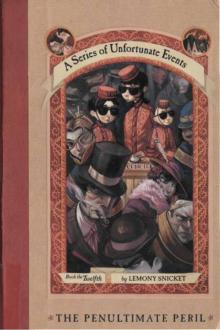 The Penultimate Peril
The Penultimate Peril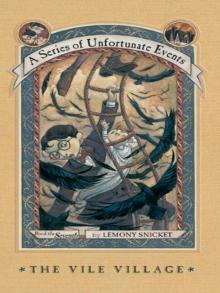 The Vile Village
The Vile Village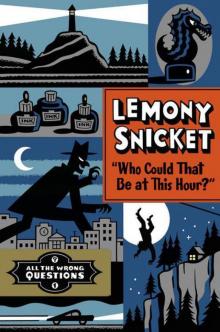 Who Could That Be at This Hour?
Who Could That Be at This Hour?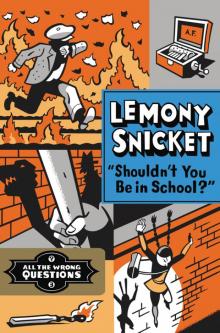 Shouldn't You Be in School?
Shouldn't You Be in School?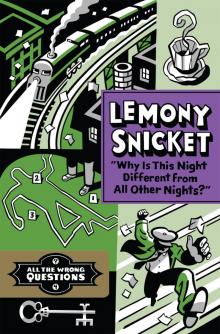 Why Is This Night Different From All Other Nights?
Why Is This Night Different From All Other Nights?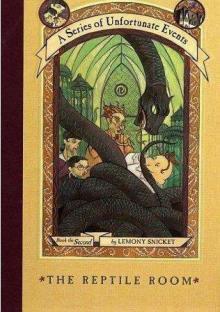 The Reptile Room
The Reptile Room File Under: 13 Suspicious Incidents (1-6)
File Under: 13 Suspicious Incidents (1-6) The End
The End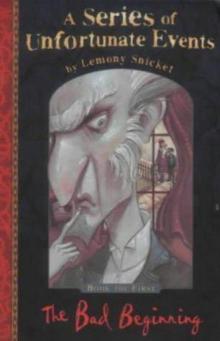 The Bad Beginning
The Bad Beginning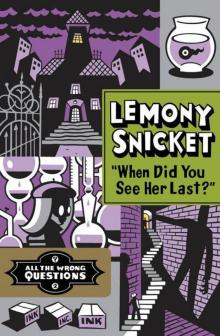 When Did You See Her Last?
When Did You See Her Last?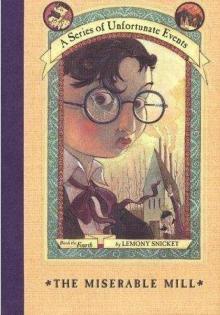 The Miserable Mill
The Miserable Mill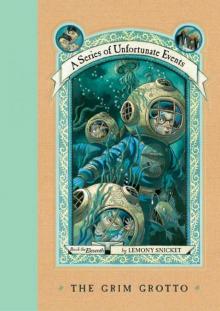 The Grim Grotto
The Grim Grotto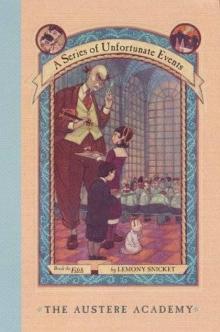 The Austere Academy
The Austere Academy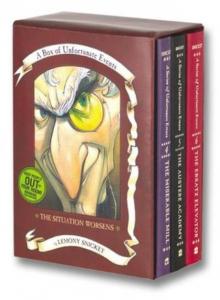 The Ersatz Elevator
The Ersatz Elevator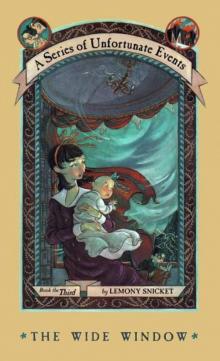 The Wide Window
The Wide Window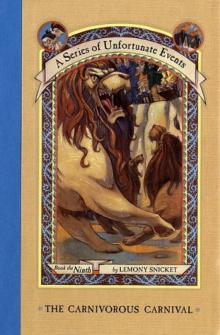 The Carnivorous Carnival
The Carnivorous Carnival A Series of Unfortunate Events Box: The Complete Wreck
A Series of Unfortunate Events Box: The Complete Wreck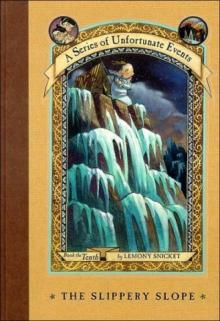 The Slippery Slope
The Slippery Slope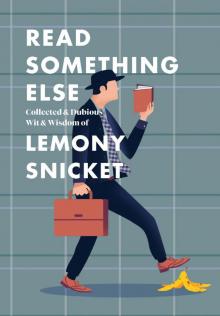 Read Something Else
Read Something Else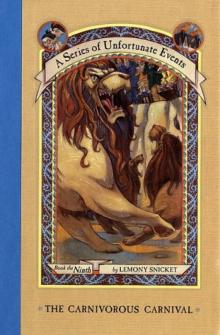 The Carnivorous Carnival asoue-9
The Carnivorous Carnival asoue-9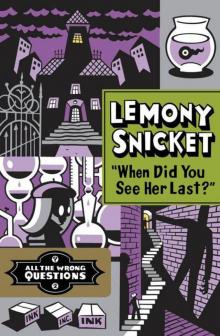 When Did You See Her Last
When Did You See Her Last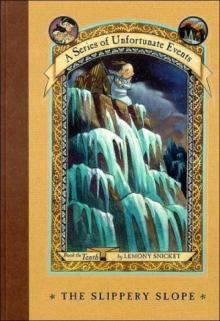 The Slippery Slope asoue-10
The Slippery Slope asoue-10 The Hostile Hospital asoue-8
The Hostile Hospital asoue-8 A Series of Unfortunate Events Collection: Books 1-13 with Bonus Material
A Series of Unfortunate Events Collection: Books 1-13 with Bonus Material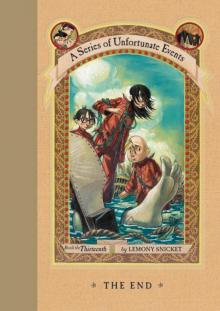 The End asoue-13
The End asoue-13 File Under
File Under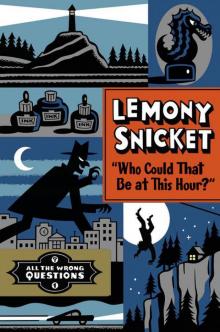 Who Could That Be at This Hour? (All the Wrong Questions)
Who Could That Be at This Hour? (All the Wrong Questions)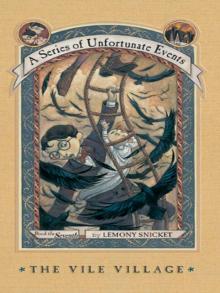 The Vile Village asoue-7
The Vile Village asoue-7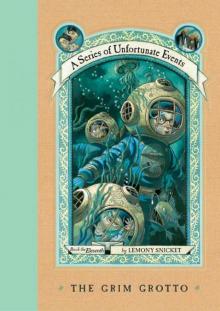 The Grim Grotto asoue-11
The Grim Grotto asoue-11